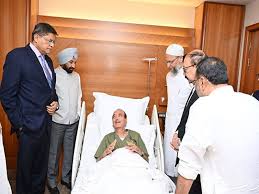Ghulam Nabi Azad hospitalised in Kuwait

Veteran Indian politician Ghulam Nabi Azad was hospitalised in Kuwait after experiencing abdominal pain during an official diplomatic visit. He is currently stable and recovering well, according to doctors.
Azad, a former Chief Minister of Jammu and Kashmir and leader of the Democratic Progressive Azad Party (DPAP), was visiting West Asian and North African countries. The visit was part of a multi-party Indian delegation aiming to strengthen India’s global image and counter Pakistan’s misinformation on Kashmir.
Sudden Health Scare in Kuwait
During his stay in Kuwait, Azad developed severe abdominal discomfort. Doctors admitted him to Royale Hayat Hospital, a leading private healthcare facility. Medical tests showed no serious issues. He remains under medical supervision and is expected to recover fully.
Azad shared an update from the hospital, saying, “I feel much better now. All my test results are normal. I’m grateful to everyone who sent their good wishes and prayers.”
Purpose of the Diplomatic Visit
The Indian delegation, led by BJP MP Baijayant Jay Panda, included leaders from several political parties. They were visiting Bahrain, Kuwait, Saudi Arabia, and Algeria as part of “Operation Sindoor.” The initiative aims to strengthen diplomatic ties and challenge false narratives promoted by Pakistan.
Before his hospitalisation, Azad participated in several important meetings in Bahrain and Kuwait. He addressed the Indian diaspora and local leaders, rejecting Pakistan’s claims about Kashmir. Azad highlighted India’s diversity and unity, countering the idea of religious or political repression.
Delegates described his speeches as impactful. His words resonated with both Indian expatriates and local officials.
Withdrawal from Rest of the Tour
Doctors advised Azad not to travel further due to health concerns. He will skip the remaining visits to Saudi Arabia and Algeria. Though disappointed, the team respects his need to rest.
Jay Panda told the media, “Azad ji played an essential role in the early meetings. His experience and voice added great value. We hope he recovers quickly and returns home soon.”
Support from Indian Leaders
News of Azad’s hospitalisation spread quickly in India. Leaders across party lines expressed concern and sent wishes for his recovery. Congress, BJP, and other regional parties acknowledged his contributions, even if they often differ with him politically.
In Jammu and Kashmir, many praised his continued commitment to national interest. A Srinagar-based political analyst said, “Azad remains a respected figure. His decision to defend India on global platforms reflects strong leadership.”
Broader Strategy Behind the Delegation
This diplomatic trip aligns with India’s recent push to engage more deeply with West Asian and North African countries. The government sees the Indian diaspora as a vital link for promoting India’s global interests.
“Operation Sindoor” brings together leaders from various parties to speak in one voice. The mission focuses on presenting India’s real image and countering propaganda on issues like Kashmir and minority rights.
Azad’s participation added credibility to the delegation. As a senior Muslim leader with roots in Kashmir, his presence helped counter false claims about religious persecution. His message carried weight, especially among international observers and diaspora groups.
Positive Outlook and Next Steps
Azad remains in Kuwait but is recovering steadily. He plans to return to India once doctors approve travel. His team says he is in good spirits and eager to resume public duties.
Although he won’t attend the final part of the tour, his impact was already felt in Bahrain and Kuwait. Delegates will carry forward his message of unity and peace.
Conclusion
Ghulam Nabi Azad’s hospitalisation highlights the intense demands placed on senior leaders. Despite his discomfort, he continued to serve during the early stages of the tour. His efforts to defend India’s image abroad were praised across political lines.
As India builds deeper global partnerships, leaders like Azad play a crucial role. His presence in diplomatic outreach shows that India’s voice remains united when it matters most.






